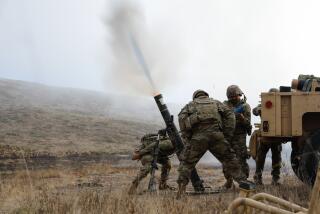San Diego Unit Deployed to Gulf War to Be Axed : Military: 13 Navy Reserve detachments also will be deactivated under cutbacks announced by Pentagon.
The San Diego-based 129th Evacuation Hospital, which was activated in 1991 for the Persian Gulf War, will be eliminated next year as part of the Pentagon’s plan to cut National Guard and reserve units throughout the nation.
Defense Department officials recommended Thursday that the 129th, an Army Reserve mobile 400-bed hospital, be deactivated by Oct. 1, 1993. The unit, with physicians, nurses, medical technicians and other support personnel has an authorized strength of 401 soldiers. About 55% of the soldiers in the unit are women.
The Pentagon’s proposed cutbacks will affect at least 1,398 reservists in San Diego County. The 129th is the only local Army Reserve unit scheduled for elimination and one of the largest to be cut in the state. Thirteen local Navy Reserve units, mostly aviation detachments, are also scheduled to be eliminated.
Three San Diego-based frigates--the Barbey, Cook and Hepburn--will lose 549 reservist slots by Sept. 30. Petty Officer 1st Class Al Holston, a Navy Reserve spokesman, said the ships are scheduled to be decommissioned and will be placed in the mothball fleet.
Several local Navy aviation reserve units, with about 310 sailors, will be eliminated by Sept. 30. Also, 138 reservists assigned to the aircraft carrier Ranger, which is scheduled for decommissioning next year, and frigate Fanning will also be removed from those ships by Oct. 1, 1993.
During the buildup for Operation Desert Storm, the normally obscure 129th became the focus of international media attention when the Army refused to allow one of its soldiers to deploy to the Persian Gulf because she was a lesbian. Pentagon regulations prohibit homosexuals from serving in the military.
Specialist Donna Lynn Jackson informed her commanding officer, Col. Victor H. Lidner, of her sexual preference when the unit was activated. Jackson said she decided to acknowledge her homosexuality because “I was going to a war zone, and I wanted an acknowledgment that I was being sent there as a lesbian.”
The Army discharged her on Jan. 17, 1991, two days after the 129th left for Saudi Arabia.
The 129th did not get to treat any wounded soldiers during the brief conflict. Instead, unit personnel busied themselves by providing medical services to civilians and assisting a local hospital.
Lidner and other Army officers did not return phone calls Thursday. However, officials familiar with the 129th and who did not want to be identified said members of the unit had been forewarned that “the 129th was on the hit list.”
It was unclear Thursday how many of the reservists in the 129th will be mustered out of the military. A source said the 129th has 395 soldiers, but that as many as 30 nursing slots are still open. The majority of the unit’s personnel will probably find spots in other Army Reserve medical units in Orange County and Fresno, the source said.
Holston said some Navy reservists affected by the cutbacks might retire, but the majority will be transferred to other ships or commands.
“The reserve crews won’t necessarily be mustered out,” Holston said.
In all, the Pentagon recommended reducing or eliminating 830 National Guard and reserve units, including Marine Corps and Air Force.
The California 40th Infantry Division (Mechanized) was one of the units hardest hit by the cutbacks.
The division, which has an authorized strength of 15,454 soldiers, will have to trim its ranks by 2,805 by Sept. 30, and Pentagon officials said that an additional 2,275 slots might have to be eliminated by Oct. 1, 1993.
Although the division’s headquarters is at Los Alamitos in Orange County, its 2nd Brigade is headquartered in Linda Vista. The brigade’s armored and support units are scattered at armories throughout San Diego and Imperial counties, with about 1,394 troops.
Maj. Patricia Antosh said Thursday that division officers still were unsure which slots will have to be eliminated and which soldiers, if any, might lose their jobs. There is a possibility that some troops may be transferred to other California National Guard units that have openings.
On Thursday, San Diego County’s congressional delegation flooded media offices with written statements announcing the cutbacks and cautioned against further trimming of the military. The proposed cuts were announced in an election year, a fact that was not lost on local congressmen with constituents who have strong ties to the military.
Rep. Randy (Duke) Cunningham, (R-San Diego), a retired Navy pilot, even found a way to attack congressional liberals in the wake of the announced military cuts. He announced that he “was fighting in Congress” to limit the cuts to the $50-billion plan offered by President Bush and the Pentagon, but warned that liberals favor a bigger cut.
Although Cunningham said he “was fighting in Congress” to limit the cuts to $50 billion, he also announced that he “did not commit to support or oppose the Pentagon’s proposal.”
More to Read
Sign up for Essential California
The most important California stories and recommendations in your inbox every morning.
You may occasionally receive promotional content from the Los Angeles Times.










